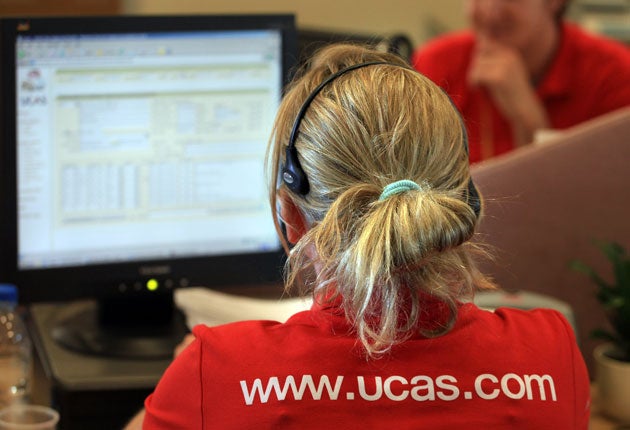Limits on student numbers must be lifted, say heads
With few jobs available, universities must be allowed to admit more undergraduates this year

Your support helps us to tell the story
From reproductive rights to climate change to Big Tech, The Independent is on the ground when the story is developing. Whether it's investigating the financials of Elon Musk's pro-Trump PAC or producing our latest documentary, 'The A Word', which shines a light on the American women fighting for reproductive rights, we know how important it is to parse out the facts from the messaging.
At such a critical moment in US history, we need reporters on the ground. Your donation allows us to keep sending journalists to speak to both sides of the story.
The Independent is trusted by Americans across the entire political spectrum. And unlike many other quality news outlets, we choose not to lock Americans out of our reporting and analysis with paywalls. We believe quality journalism should be available to everyone, paid for by those who can afford it.
Your support makes all the difference.Universities must be allowed to exceed admission targets so that more young people can study, the leader of the Headmasters' and Headmistresses' Conference (HMC) said yesterday.
Geoff Lucas, the general secretary of the HMC, which represents 250 leading independent schools in the UK, said there is a strong financial argument for universities being allowed to offer places to students beyond current admission targets.
"We want to put pressure on the Government to reduce the potential fines for universities that over recruit. Our view, this year particularly, is that with the potent cocktail of factors – reduced funding, fewer places and bleak employment opportunities, the Government ought to be more sensitive in looking at each university on a case-by-case basis rather than issuing an automatic fine," Mr Lucas said. "There's going to be a cost if these applicants are unemployed, so there's a counteracting fiscal argument. If the universities are willing to take students and there are potential places, it would be much more equitable and sensible."
Last year, £16m in grants was stripped from universities and colleges that recruited too many students – £3,778 per student for 4,235 places in 60 institutions. More than 660,000 people have applied for university this year, and record numbers of school leavers, including those predicted to get top grades, will be turned away, experts predict. They face tough competition from mature students, many of whom were rejected last year. Bleak employment prospects have also led to increased numbers of students applying for degree courses. As a result, as many as 225,000 students are likely to miss out on places.
Mr Lucas warned that less-advantaged students could well be the ones likely to miss out. "It is undoubtedly true that social class and parental factors will have a significant affect on the experiences and opportunities that students have. Schools which have a tradition of sending children to university are honed and practised, whether it's Oxbridge interviews or that they are more familiar with the whole process. We have noticed in the past year the growing complexity of the application process."
Important factors are more likely to be missed, such as whether a student's education has been interrupted through illness or family disruption.
David Willetts, the Universities minister, sparked a row on Friday when he suggested that too many students were being set up for degree disappointment because they are getting poor advice from schools. He claimed they chose A-levels that were not valued or appropriate for the degrees they wanted to take. "There are people who do stay on for A-levels but they are doing PE, religious studies and geography, and they say they want to be an engineer," he said.
His comments brought immediate condemnation from many teaching unions. However, yesterday Andrew Grant, director of the Independent Schools Council and headmaster of St Albans School, applauded Mr Willetts' comments, saying: "What he was saying was, schools like ours... are treating our pupils fairly. The unfairness lies in the poor treatment that too many children get. There are schools where the advice is wanting, and I know this from experience. One of my nieces was given poor advice from her school, not because anybody was negligent, but because it wasn't co-ordinated. The school did not look at the overall picture in terms of what that would mean to high-demand universities."
Join our commenting forum
Join thought-provoking conversations, follow other Independent readers and see their replies
Comments